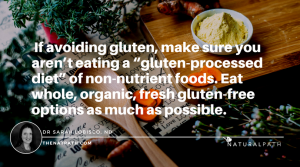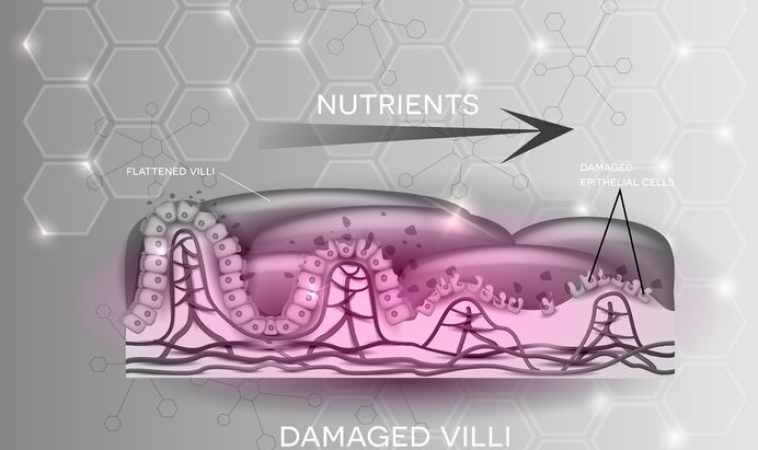The Gluten Controversy Continues (Part II)
 In the first partof this article series, I explained the concepts beyond the “gluten-free movement” and why gluten can cause such havoc in our bodies. Now, I will continue on with the controversy over gluten sensitivity and why gluten alone is not a dietary scapegoat for all conditions.
In the first partof this article series, I explained the concepts beyond the “gluten-free movement” and why gluten can cause such havoc in our bodies. Now, I will continue on with the controversy over gluten sensitivity and why gluten alone is not a dietary scapegoat for all conditions.
From Being “Sensitive” to Getting a Diagnosis, To Accepted, To Criticized Again: The Plight of the
“Gluten- Sensitized”
Up until recently, it was not well accepted or understood by conventional medicine that gluten was an issue for anyone outside of those with a true wheat allergy or the autoimmune condition of the small intestine that occurs with gluten consumption, known as celiac disease.1-8
For many in the medical community, the fact that someone was “sensitive to gluten” was confusing without a reliable method of diagnosis and the lack of accessible clinical trials that demonstrated that symptoms that were relieved with gluten elimination were truly related to the gluten.2, 6-8
For this reason, conventional and integrative doctors clashed in the recommendations. Medical doctors were concerned with the unnecessary removal of food groups from the diet causing nutrient deficiencies. Integrative doctors were seeing exceptional turnarounds in symptoms for some patients off gluten. They argued that when done responsibly, gluten removal and grains are not necessary for a balanced diet.6-8
Vindicated!!!???
In the past few years, various studies are in fact demonstrating that NCGS is, in fact, a distinct entity with measurable immune responses and markers.1-5,8
In fact, one recent study compared 80 self-reported subjects with NGCD to 40 celiac disease subjects and 40 participants in the control group. It was demonstrated that the gluten sensitive individuals had significantly higher immune activation markers (lipopolysaccharide-binding protein (LBP) and sCD14) as compared to the other two groups. Furthermore, they demonstrated similar damage to their intestinal lining ((elevated serum marker fatty acid-binding protein 2 (FABP2)) to the celiac disease group with evidence intestinal permeability. A result supported by elevated levels of serum marker FABP2.5
OKAY, It’s Settled!! Gluten-Free is the Way to Go…Not So Fast
Therefore, it’s settled, right? Gluten sensitivity is real and everyone should avoid it?
Well, a good clinician will tell you that gluten should be avoided in those who are sensitive to it and who have celiac disease, or other indicators, that point to supporting the body with the removal of gluten. In all honesty, that is most people seeking to heal chronic conditions, at least initially.
However, it’s important to remember that not everyone reacts the same to gluten. Celiac disease is related to the milieu of the trigger (gluten), intestinal permeability, genetics, and the body’s resilience to deal with the “broken gut.” Gluten sensitivity also appears to have a similar setting to ensue, just with a different response.1-10
We have to consider the reason why celiac and NGCS are on the rise. For example, we haven’t even discussed the influence of the microbiome, food processing, hybridization of wheat, and glyphosate at all. These should all be considered as well as a comprehensive approach for healing the “leaky gut” if someone struggles with gluten.10-12
Therefore, make sure, if you do avoid gluten, you aren’t eating a “gluten-processed diet” of non-nutrient foods. Eat whole, organic, fresh gluten-free options as much as possible.
The Bottom Line
The bottom line is that most agree that gluten can trigger a lot of symptoms for many people. However, it shouldn’t be confused as the “cause” of the problem. There is more to the issue than simply removing gluten and everything being okay.
It’s probably a good start though.
The End?
Phew….
That was quite a review…I haven’t finished, though.
There’s actually more to the story, way more than I can cover sanely for you, or me. However, I have a condensed short and sweet summary here of how the boat has been rocked again on “gluten-free.” This is in relationship to what I just discussed, it’s not that gluten is the cause, but it is a powerful trigger.
References:
- Biesiekierski JR, Iven J. Non-coeliac gluten sensitivity: piecing the puzzle together. United European Gastroenterology Journal. 2015;3(2):160-165. doi:10.1177/2050640615578388.
- Brown A. Gluten Sensitivity. Problems of an Emerging Condition Separate From Celiac Disease. Expert Rev Gastroenterol Hepatol. 2012;6(1):43-55.
- Catassi C, Elli L, Bonaz B, et al. Diagnosis of Non-Celiac Gluten Sensitivity (NCGS): The Salerno Experts’ Criteria. Nutrients. 2015;7(6):4966-4977. doi:10.3390/nu7064966.
- Biesiekierski JR, Iven J. Non-coeliac gluten sensitivity: piecing the puzzle together. United European Gastroenterology Journal. 2015;3(2):160-165. doi:10.1177/2050640615578388.
- Uhde M, Ajamian M, Caio G, et al. Intestinal cell damage and systemic immune activation in individuals reporting sensitivity to wheat in the absence of coeliac disease. July 25, 2016. doi:10.1136/gutjnl-2016-311964.
- Hamblin, J. This Is Your Brain on Gluten. The Atlantic. Dec 20, 2013. http://www.theatlantic.com/health/archive/2013/12/this-is-your-brain-on-gluten/282550/
- Virgin JJ. Solving the Gluten-Free Debate. Huffington Post. March 26, 2014. http://www.huffingtonpost.com/jj-virgin/gluten-free_b_5022512.html
- Brown A. Gluten Sensitivity. Problems of an Emerging Condition Separate From Celiac Disease. Expert Rev Gastroenterol Hepatol. 2012;6(1):43-55.
- De Sousa Moraes LF, Grzeskowiak LM, de Sales Teixeira TF, Gouveia Peluzio M do C. Intestinal Microbiota and Probiotics in Celiac Disease. Clinical Microbiology Reviews. 2014;27(3):482-489. doi:10.1128/CMR.00106-13.
- Fasano A. Surprises for Celiac Disease. Scientific American. 2009. http://www.komar.org/faq/celiac_disease/Fasano-Scientific-American-8.2009-1.pdf
- Specter M. Against the Grain. Should you go gluten-free? The New Yorker. November 3, 2014. http://www.newyorker.com/magazine/2014/11/03/grain
- Mercola J. How to Safely Bring Wheat Back Into Your Diet. Mercola.com. January 22, 2017.
 Sarah LoBisco, ND, is a graduate of the University of Bridgeport’s College of Naturopathic Medicine (UBCNM). She is licensed in Vermont as a naturopathic doctor and holds a Bachelor of Psychology from State University of New York at Geneseo. Dr. LoBisco is a speaker on integrative health, has several publications, and has earned her certification in functional medicine. Dr. LoBisco currently incorporates her training as a naturopathic doctor and functional medicine practitioner through writing, researching, private practice, and through her independent contracting work for companies regarding supplements, nutraceuticals, essential oils, and medical foods. Dr. LoBisco also enjoys continuing to educate and empower her readers through her blogs and social media. Her recent blog can be found atwww.dr-lobisco.com.
Sarah LoBisco, ND, is a graduate of the University of Bridgeport’s College of Naturopathic Medicine (UBCNM). She is licensed in Vermont as a naturopathic doctor and holds a Bachelor of Psychology from State University of New York at Geneseo. Dr. LoBisco is a speaker on integrative health, has several publications, and has earned her certification in functional medicine. Dr. LoBisco currently incorporates her training as a naturopathic doctor and functional medicine practitioner through writing, researching, private practice, and through her independent contracting work for companies regarding supplements, nutraceuticals, essential oils, and medical foods. Dr. LoBisco also enjoys continuing to educate and empower her readers through her blogs and social media. Her recent blog can be found atwww.dr-lobisco.com.

















